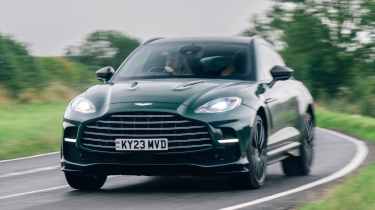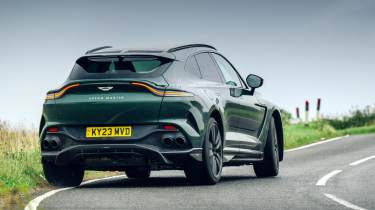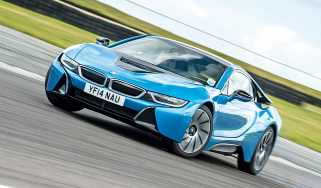Aston Martin DBX707 Fast Fleet test – 10,000 miles in Britain’s 697bhp Cayenne fighter
Six months in the DBX707 proved that Aston Martin's super SUV is one of the best of the breed, even with the pre-update HMI
We have now covered over 20,000 miles in Aston Martin DBXs on evo’s Fast Fleet, initially with the original 542bhp model for six months in 2021, then more recently in this 697bhp 707 version.
It remains one of the few dynamic success stories within the performance SUV sector. Alongside the Porsche Cayenne Turbo GT, and the Ferrari Purosangue, it’s one of a small group of 2.2-ton-plus behemoths that can walk the walk they talk so much about. Audi’s RS Q8, BMW’s X5M, X6M and XM, anything with an AMG badge, the Urus… they’re predominately marketing exercises chasing numbers. The lesser models in their families are all better at doing what they were initially designed to do.
Which is where the DBX scores so highly. It was designed to be a luxury performance SUV from the outset, and it won’t come as a surprise to hear that the 707 hits harder when it comes to its performance brief.
Its advantage and greater impression of speed over the original 542 wasn’t when you wound the drive mode up to Sport+ (via the new rotary control in the centre console rather than the push controls of the original) and pretended you were in a Vantage GT8, because despite its crisper, more precise steering, tighter body control and more detailed balance, there are very few roads that are suitable for a car of this size to be let fully off its leash.
More reviews
Rather it was when you wanted to make progress that its 155bhp and 147lb ft advantage (giving totals of 697bhp and 693lb ft) was instantly welcome and very much needed to get 2245kg moving swiftly and on its toes with less effort.
The investment that went into developing the 707’s chassis was one that Aston couldn’t afford when developing the original DBX, and the dynamic improvement was abundantly accessible when the right road came along, or when I found myself on Silverstone’s GP circuit: a car of this size and bulk has no right to carve such clean lines and make you such an integral part of the process. There were drives in the 707 that had me thinking Aston Martin had created an upscaled M3 Touring.
Its size and mass never truly drift away, though, and the deeper you dive into the 707’s character, the closer you get to reaching the limit of its (high) ability. Allow your enthusiasm to run away with you and that solid body control begins to soften, the forces squeezed through the air springs and active dampers eventually gaining the upper hand as body roll takes hold, removing some of the clarity and precision the 707 displays until that point.
It outperforms the standard DBX (which was phased out to leave only the 707 in the line-up for 2024) in every area bar ride quality, the more powerful model’s 23-inch wheels and tyres far more sensitive to tyre pressures. Where it does stumble, however, is when it comes to expected luxury. Even before the elegance of the new DB12 was revealed, the DBX’s interior came in for criticism. A carry-over from the DB11/Vantage/DBS era, it never had the design, details or material finish expected of a car costing the thick end of £200,000. It looked dated to 2020 when it was launched.
> Aston Martin DBX707 2024 review – still a step ahead of the pack?
The old Mercedes HMI system has been replaced as has a large proportion of the car’s interior, with a much needed DB12 inspired revamp. Despite the impressive configurability Aston Martin offers for DBX interiors – who knew gold carbonfibre would work with tan leather? – the 707 before the cabin update, lacked the quality of a Range Rover and the detailing of a Bentley.
The team at Gaydon also needs to work on the 707’s exterior fit and finish, specifically the aerokit that completes the car’s design. From afar it adds the aggression we’re told the market demands, but up close the gaps between the additional trim elements are unforgivable and need addressing. That you won’t be able to buy a DBX without the aero enhancements fitted going forward is a further incentive/requirement for Aston to resolve this.
Is the DBX still one of the best of its breed? Yes it is. The Purosangue costs an additional six figures again and, V12 aside, I struggle to see where the extra money goes. The Bentley Bentayga can’t shake off its VW Group DNA dynamically, and the Urus makes the 707 look smart and sophisticated. Yet having been fortunate to run both versions of Aston’s SUV, my choice would be the 707’s engine and chassis clothed in the original’s simpler, cleaner and more classy design.
| Date acquired | April 2023 |
|---|---|
| Duration of test | 3 months |
| Total test mileage | 10,085 |
| Overall mpg | 21.7 |
| Total costs | £0 |
| Purchase price | £223,000 |
| Value today | c£150,000 |
This story was first featured in evo issue 318







